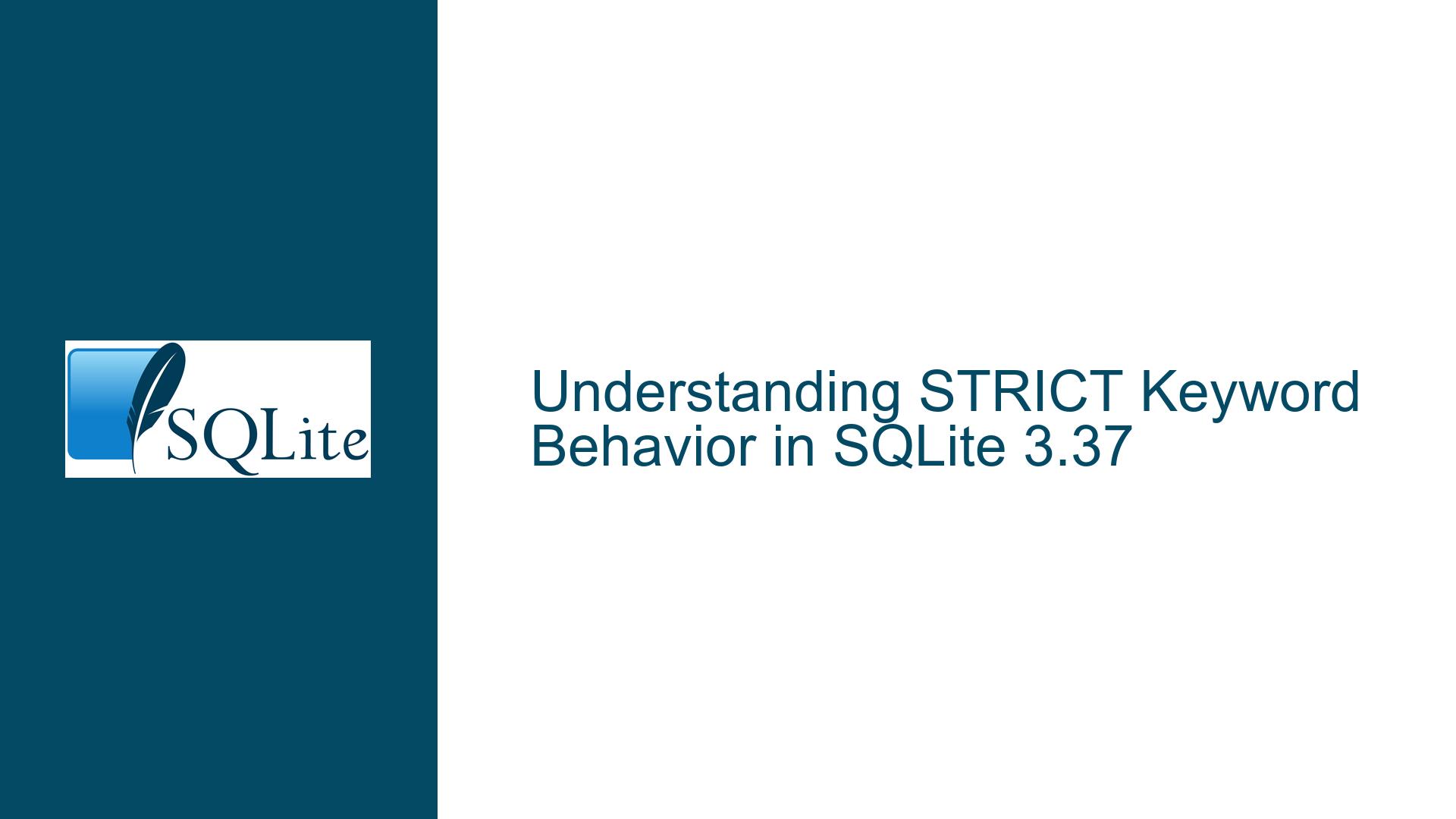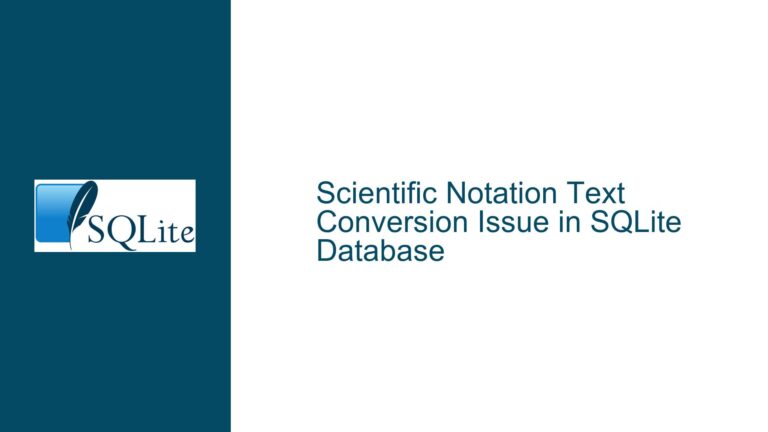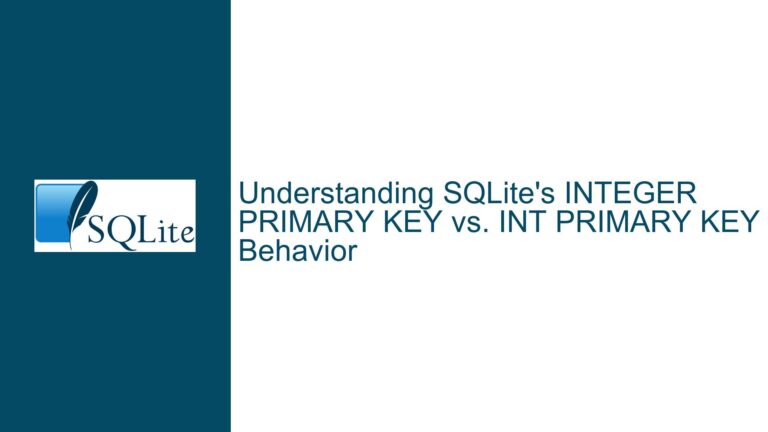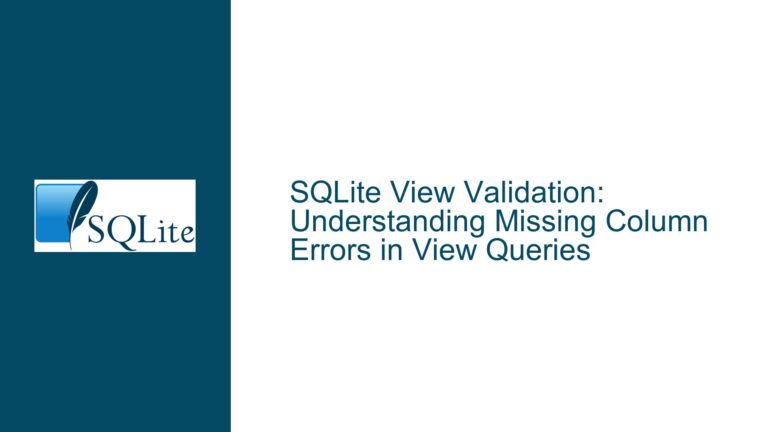STRICT Keyword Behavior in SQLite 3.37
Issue Overview: STRICT Keyword Ambiguity in SQLite 3.37
The core issue revolves around the ambiguous classification of the STRICT keyword in SQLite 3.37. While the SQLite documentation refers to STRICT as a keyword in the context of creating strict tables, the lexical analyzer and the sqlite3_keyword_name function do not recognize STRICT as a keyword. This discrepancy has led to confusion among developers who rely on SQLite’s keyword handling mechanisms for schema design and query optimization.
The STRICT keyword is specifically used in the CREATE TABLE statement to enforce strict typing on table columns. When a table is created with the STRICT keyword, SQLite enforces data type constraints more rigorously, preventing the insertion of values that do not match the specified column types. This feature is particularly useful for developers who need to ensure data integrity and consistency in their databases.
However, the ambiguity arises because the STRICT keyword is not treated uniformly across different components of SQLite. The lexical analyzer, which is responsible for tokenizing SQL statements, does not classify STRICT as a keyword. Instead, it treats STRICT as an identifier. This means that STRICT can be used as a table or column name without any issues, which is not the case for fully reserved keywords like SELECT or INSERT.
On the other hand, the parser, which interprets the tokenized SQL statements, recognizes STRICT as a keyword when it appears in the context of a CREATE TABLE statement. This dual behavior of STRICT—being treated as an identifier by the lexical analyzer and as a keyword by the parser—creates a unique situation that can lead to confusion and potential issues in schema design and query execution.
Possible Causes: Why STRICT is Not Recognized as a Keyword
The primary cause of this issue lies in the way SQLite’s lexical analyzer and parser handle keywords. SQLite’s lexical analyzer is designed to recognize a fixed set of reserved keywords that are fully integrated into the SQL syntax. These keywords are stored in a compacted word table, which is used by functions like sqlite3_keyword_name to identify and validate keywords.
However, STRICT is not included in this compacted word table. Instead, it is treated as a semi-special keyword that is only recognized by the parser in specific contexts. This design decision was likely made to maintain backward compatibility and to avoid breaking existing applications that might use STRICT as an identifier.
Another contributing factor is the evolution of SQLite’s feature set. The STRICT keyword was introduced in SQLite 3.37 as part of the strict tables feature. This feature was added to provide developers with more control over data type enforcement, but it was not fully integrated into the existing keyword handling mechanisms. As a result, STRICT exists in a gray area where it is not fully recognized as a keyword by all components of SQLite.
The documentation also plays a role in this confusion. The SQLite documentation refers to STRICT as a keyword in the context of strict tables, but it does not explicitly state that STRICT is not recognized by the lexical analyzer or the sqlite3_keyword_name function. This lack of clarity can lead developers to assume that STRICT is a fully reserved keyword, which is not the case.
Troubleshooting Steps, Solutions & Fixes: Addressing STRICT Keyword Ambiguity
To address the ambiguity surrounding the STRICT keyword, developers need to understand the specific contexts in which STRICT is recognized as a keyword and take appropriate steps to ensure that their schema designs and queries are compatible with SQLite’s handling of STRICT.
1. Understanding the Contextual Recognition of STRICT:
The first step in troubleshooting this issue is to recognize that STRICT is only treated as a keyword by the parser when it appears at the end of a CREATE TABLE statement. In all other contexts, STRICT is treated as an identifier. This means that developers can use STRICT as a table or column name without any issues, but they must be careful when using it in the context of a CREATE TABLE statement.
For example, the following SQL statement will create a table with strict typing:
CREATE TABLE my_table (
id INTEGER PRIMARY KEY,
name TEXT
) STRICT;
In this case, STRICT is recognized as a keyword by the parser, and the table will enforce strict typing on its columns. However, the following statement will create a table named STRICT:
CREATE TABLE STRICT (
id INTEGER PRIMARY KEY,
name TEXT
);
In this case, STRICT is treated as an identifier by the lexical analyzer, and the table will not enforce strict typing.
2. Avoiding Conflicts with STRICT as an Identifier:
Since STRICT is not fully reserved as a keyword, developers should be cautious when using it as an identifier in their schema designs. While it is technically possible to use STRICT as a table or column name, doing so can lead to confusion and potential issues, especially if the schema is shared with other developers who may not be aware of the specific behavior of STRICT in SQLite.
To avoid conflicts, developers should consider using alternative names for tables and columns that might otherwise be named STRICT. For example, instead of naming a table STRICT, developers could use a more descriptive name like strict_table or strict_data.
3. Updating Documentation and Code Comments:
Given the ambiguity surrounding the STRICT keyword, it is important for developers to document their schema designs and queries clearly. This includes adding comments to SQL statements that use STRICT to indicate its specific behavior in SQLite.
For example, the following SQL statement includes a comment that clarifies the use of STRICT:
-- Create a table with strict typing
CREATE TABLE my_table (
id INTEGER PRIMARY KEY,
name TEXT
) STRICT; -- STRICT is recognized as a keyword by the parser in this context
By adding such comments, developers can help ensure that other team members understand the specific behavior of STRICT and avoid potential issues.
4. Monitoring SQLite Updates and Documentation Changes:
SQLite is an actively developed database engine, and its behavior regarding keywords and other features may change over time. Developers should monitor SQLite’s release notes and documentation updates to stay informed about any changes to the handling of STRICT or other keywords.
In particular, developers should keep an eye out for updates to the sqlite3_keyword_name function and the compacted word table. If STRICT is added to the compacted word table in a future release, it will be recognized as a fully reserved keyword, and its behavior may change accordingly.
5. Using Alternative Methods for Strict Typing:
If the ambiguity surrounding STRICT is a concern, developers can consider using alternative methods to enforce strict typing in their tables. One approach is to use CHECK constraints to enforce data type constraints on individual columns.
For example, the following SQL statement uses CHECK constraints to enforce strict typing on a table:
CREATE TABLE my_table (
id INTEGER PRIMARY KEY,
name TEXT CHECK(typeof(name) = 'text')
);
In this case, the CHECK constraint ensures that the name column only accepts values of type TEXT. While this approach requires more effort than using the STRICT keyword, it provides greater flexibility and avoids the ambiguity associated with STRICT.
6. Reporting Issues and Contributing to SQLite Development:
If developers encounter issues related to the handling of STRICT or other keywords in SQLite, they should consider reporting these issues to the SQLite development team. The SQLite project is open-source, and the development team welcomes feedback and contributions from the community.
Developers can report issues and contribute to SQLite development through the SQLite website or GitHub repository. By participating in the development process, developers can help improve SQLite’s handling of keywords and other features, making it a more robust and reliable database engine for everyone.
Conclusion:
The ambiguity surrounding the STRICT keyword in SQLite 3.37 is a result of its unique handling by the lexical analyzer and parser. While STRICT is recognized as a keyword by the parser in the context of a CREATE TABLE statement, it is not recognized as a keyword by the lexical analyzer or the sqlite3_keyword_name function. This dual behavior can lead to confusion and potential issues in schema design and query execution.
To address this issue, developers should understand the specific contexts in which STRICT is recognized as a keyword, avoid using STRICT as an identifier, document their schema designs and queries clearly, monitor SQLite updates, consider alternative methods for strict typing, and contribute to SQLite development. By taking these steps, developers can ensure that their use of STRICT is compatible with SQLite’s behavior and avoid potential issues in their database applications.






